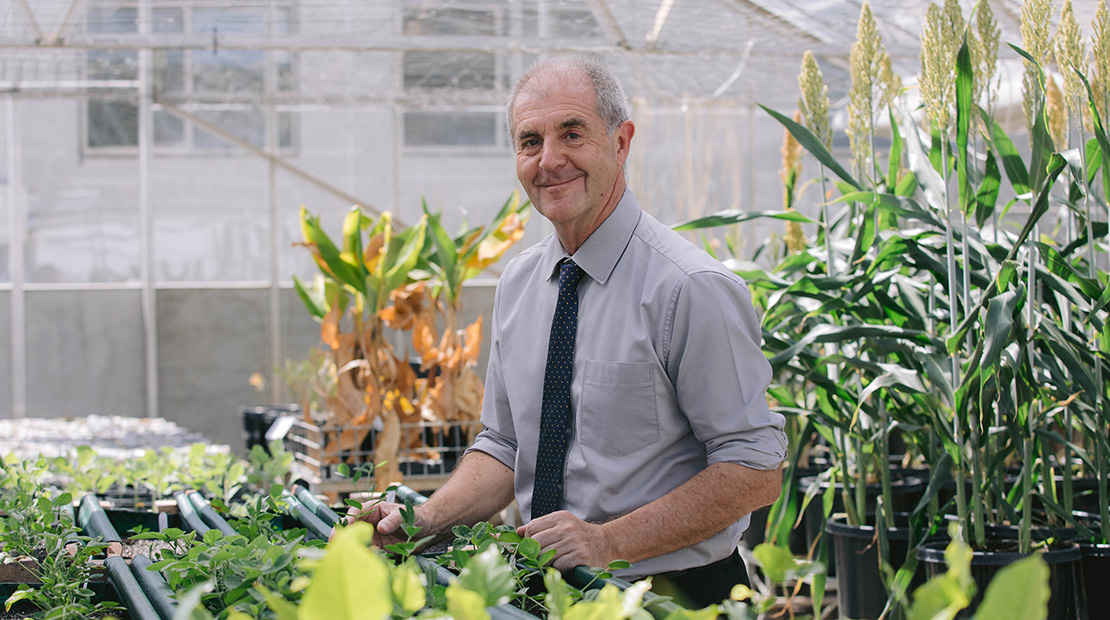Finding cures in plants
Imagine if you could eat potato chips that help you to lose weight, or drink tea infused with medicine to treat cancer.
This is not a script for a sci-fi movie, but like any good movie, it is based on a cracking story.
Professor David Craik from The University of Queensland’s Institute for Molecular Bioscience wanted to address one of the world’s greatest health challenges - to find a way to make medicines more affordable, more effective and more accessible.
The answer? Something growing in your backyard.
“We’re engineering plants into super-efficient producers of next-generation medicines to treat a range of conditions that should be more effective, safer, and less costly than current drugs,” Professor Craik said.
“Plant-grown drugs would be more accessible - instead of needing expensive chemical factories and complicated transport chains to make and distribute our medicines, we could have plants making these medicines.
“People could grow their medicines in their backyard, or we could even make the medicine in the seed of a plant which people then eat.”
Professor Craik’s lab is now putting anti-cancer drugs in sunflower and soybean plants and pain relief drugs in Arabidopsis plants, a common weed in the cabbage family.
Potatoes are also being weighed up.
“We’ve actually proven that we can make a molecule that acts on a receptor in your brain that affects appetite, and we want to put that molecule into potatoes, so that effectively you can have your McDonald’s fries and not worry about gaining weight,” he said.
Professor Craik is also employing the native Australian tobacco plant, Nicotiana benthamiana, by using it to grow a potent painkiller based on a molecule they discovered in marine cone snails off the coast of Queensland.
“When one thinks of the term tobacco, visions of smoke and lung cancer come to mind, but we use these plants to produce medicines with potential to save lives,” he said.
Professor Craik said while none of these products was currently commercially available, the research was well advanced.
“To get a drug onto the market takes 12 years and US$2 billion, so this is not the sort of thing that will happen next week,” he said.
“The molecules that we’re working on have been tested in the lab and we know that they work but clinical trials could be 5 – 10 years off.”

Professor Craik has already invested decades in this research, travelling the world over the past 20 years investigating which plants had these properties.
“I’ve been chopping my way with a machete through jungles in Thailand and on the Cambodian border, discovering plants and then working out what’s in them and what we can do with them,” he said.
Professor Craik’s research has attracted worldwide interest and received support from the Clive and Vera Ramaciotti Foundation, and is also part of the Australian Research Council Centre of Excellence for Innovations in Peptide and Protein Science, headed up by Professor Craik.
Professor Craik’s idea of investigating plants to produce medicines was inspired by hearing of a Norwegian doctor in the 1970s, who studied a plant being brewed and drunk by women in labour in the Congo.
“This doctor wondered why women always gave birth faster in Africa than they did in Norway and he discovered that they were making a medicine from this tea and something in the plant was acting on the uterus,” Professor Craik said.
Professor Craik found that the African plant had mini proteins with a “weird” and “unusual” circular structure that made them very stable.
Inspired by the African women, Professor Craik and his research team discovered that plants with these circular proteins, which he named cyclotides, could be used to administer a range of medicines.
Earlier this year, Professor Craik was elected as a Fellow of the oldest scientific society in the world, the Royal Society, for his outstanding contribution to science.
“I’m supposed to be in London now, signing a book that Charles Darwin, Sir Isaac Newton and Stephen Hawking all signed with a goose feather,” he said.
“That’s obviously not happening because of COVID but hopefully it will happen next year.”
For now though, Professor Craik and his team are toiling hard in the lab in Brisbane, with the next step making plant production commercially viable.
“Our work will then have come a full circle, from discovering drugs in plants to making drugs in plants.”
General enquiries
+61 7 3346 2222
imb@imb.uq.edu.au
Media enquiries
IMB fully supports UQ's Reconciliation Action Plan and is implementing actions within our institute.
Support us
Donate to research
100% of donations go to the cause

